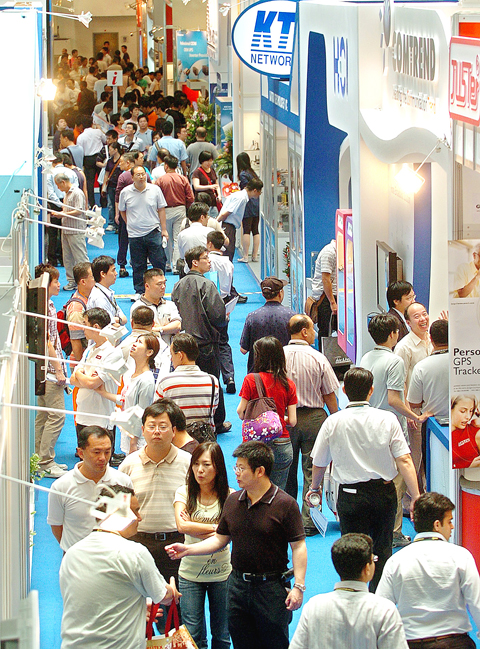Computex, the second-biggest computer trade show in the world, attracted a record number of buyers this year, with the fastest growing percentage coming from emerging markets such as China and India because the economic slump seemed to have a less severe impact on their economies, a co-organizer of the event said yesterday.
This year, the number of overseas buyers climbed 1 percent compared with last year to 34,900, the highest since the show began three decades ago, initial statistics from government-financed Taiwan External Trade Development Council (TAITRA, 外貿協會) showed. But the number of local buyers leapt by more than 10 percent to 84,000 from a year ago.
“Messages from Computex exhibitors indicate the economic recession did not have a serious impact on customers’ billing during Computex. Instead, the billing is better than expected,” said Walter Yeh (葉明水), executive vice president of TAITRA.

PHOTO: FANG PIN-CHAO, TAIPEI TIMES
“We felt relieved that the A(H1N1) flu epidemic did not prevent global buyers from coming to Taiwan,” Yeh said.
The show is expected to help local exhibitors secure US$20 billion in orders, unchanged from last year, because the latest gadgets such as next-generation netbooks have a strong appeal to overseas purchasers from big companies such as Germany’s Siemens, Yeh said.
“The new orders will help local companies offset the impact from the economic downturn and also signals a positive sign for the business outlook for the rest of the year,” he said.
Local companies also secured more than US$100 million in orders through face-to-face talks arranged with global buyers, TAITRA said. Those deals could bring more orders in the subsequent year, bringing total orders to US$700 million, more than doubling from NT$300 million last year, the council said.
The number of of buyers from China climbed by the fastest rate, 34 percent, to 1,419 excluding those from Hong Kong, compared with last year, Yeh said. He added that improving cross-strait trade ties and the government’s relaxed cross-strait polices such as direct flights were the main reasons for the increase.
Buyers from the US rose by just 0.7 percent to 5,017 during the first four days compared with last year, bucking the downtrend of the US’ economy, TAITRA said. The top five overseas buyers were from the US, Japan, Hong Kong, China and South Korea.
Netbooks, portable navigation devices, smartphones, mobile Internet devices and electronic readers were at the top Computex buyers’ shopping list, TAITRA said.

SETBACK: Apple’s India iPhone push has been disrupted after Foxconn recalled hundreds of Chinese engineers, amid Beijing’s attempts to curb tech transfers Apple Inc assembly partner Hon Hai Precision Industry Co (鴻海精密), also known internationally as Foxconn Technology Group (富士康科技集團), has recalled about 300 Chinese engineers from a factory in India, the latest setback for the iPhone maker’s push to rapidly expand in the country. The extraction of Chinese workers from the factory of Yuzhan Technology (India) Private Ltd, a Hon Hai component unit, in southern Tamil Nadu state, is the second such move in a few months. The company has started flying in Taiwanese engineers to replace staff leaving, people familiar with the matter said, asking not to be named, as the

The prices of gasoline and diesel at domestic fuel stations are to rise NT$0.1 and NT$0.4 per liter this week respectively, after international crude oil prices rose last week, CPC Corp, Taiwan (台灣中油) and Formosa Petrochemical Corp (台塑石化) announced yesterday. Effective today, gasoline prices at CPC and Formosa stations are to rise to NT$27.3, NT$28.8 and NT$30.8 per liter for 92, 95 and 98-octane unleaded gasoline respectively, the companies said in separate statements. The price of premium diesel is to rise to NT$26.2 per liter at CPC stations and NT$26 at Formosa pumps, they said. The announcements came after international crude oil prices

DOLLAR SIGNS: The central bank rejected claims that the NT dollar had appreciated 10 percentage points more than the yen or the won against the greenback The New Taiwan dollar yesterday fell for a sixth day to its weakest level in three months, driven by equity-related outflows and reactions to an economics official’s exchange rate remarks. The NT dollar slid NT$0.197, or 0.65 percent, to close at NT$30.505 per US dollar, central bank data showed. The local currency has depreciated 1.97 percent so far this month, ranking as the weakest performer among Asian currencies. Dealers attributed the retreat to foreign investors wiring capital gains and dividends abroad after taking profit in local shares. They also pointed to reports that Washington might consider taking equity stakes in chipmakers, including Taiwan Semiconductor

A German company is putting used electric vehicle batteries to new use by stacking them into fridge-size units that homes and businesses can use to store their excess solar and wind energy. This week, the company Voltfang — which means “catching volts” — opened its first industrial site in Aachen, Germany, near the Belgian and Dutch borders. With about 100 staff, Voltfang says it is the biggest facility of its kind in Europe in the budding sector of refurbishing lithium-ion batteries. Its CEO David Oudsandji hopes it would help Europe’s biggest economy ween itself off fossil fuels and increasingly rely on climate-friendly renewables. While